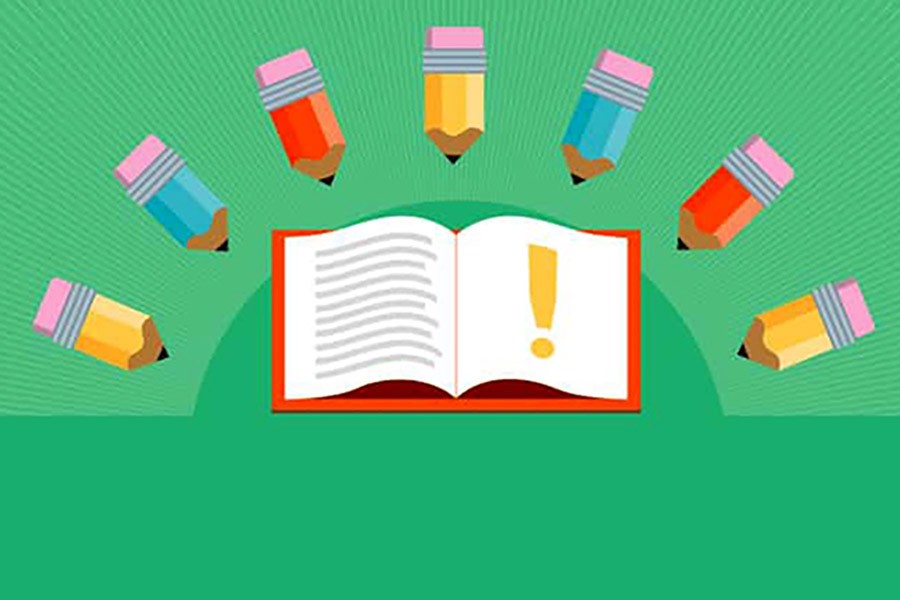Literacy is a fundamental right of all. It contributes to one's empowerment and development as well as socio-economic advancement of a nation. Since 1967, the United Nations Educational, Scientific and Cultural Organisation (UNESCO) has been observing International Literacy Day (ILD) on September 08 every year. The purpose has been to raise global awareness to eradicate illiteracy.
According to UNESCO, "Literacy is the ability to identify, understand, interpret, create, communicate and compute, using printed and written materials associated with varying contexts. Literacy involves a continuum of learning in enabling individuals to achieve their goals, to develop their knowledge and potential, and to participate fully in their community and wider society."
Despite administering a free and compulsory primary education system for over 27 years, a large number of persons remain illiterate in Bangladesh. Concerned policymakers and economists underscore that an improved literacy level is critically vital for continuing growth and higher national productivity.
An overwhelming 99 per cent of global uneducated adults live in the poverty-stricken countries of South Asia, West Asia and Sub-Saharan Africa who are unable to read and write. On the other hand, Andorra, Canada, Finland, Estonia, Japan, Luxemburg, Latvia, Norway, South Korea and Russia are some of the nations that could almost wholly eradicate illiteracy.
There is a correlation between poverty and illiteracy. Those living below the poverty level in Bangladesh and elsewhere have little or no access to education. They cannot afford kids' books, attire, and other essentials in their homes. Also, the poorest of the poor parents often compel them to work for small economic return than pursuing education.
Recognising the right to education, the architects of the Bangladesh Constitution provided for the establishment of "a uniform, mass-oriented and universal system of education and extending free and compulsory education to all children…." (Article 17). Later in 1990, to facilitate access to elementary education, Parliament enacted the Compulsory Primary Education Act.
The course of action reflected Bangladesh's commitment to ensure constitutional rights and opportunities of education for all. Economists believe attainment of 100 per cent literacy level will vastly empower the nation to realise sustainable development goals.
At the dawn of independence in 1971, the literacy rate of the country was a meagre 17.6 per cent. During the past four decades, a remarkable development in literacy has been achieved. However, until now, all the successive governments have failed to deliver high quality, uniform and mass-oriented system of education.
According to Bangladesh Bureau of Statistics (BBS), the literacy rate in the country was 73.9 per cent in 2018. The UNESCO Institute for Statistics (UIS) reveals that Bangladesh is well ahead of other South Asian countries, namely Bhutan, India, Nepal, and Pakistan in the global literacy rate index.
Despite impressive progress, literacy challenges persist in Bangladesh. Government data show that about 26.1 per cent of the estimated 164.7 million people remain uneducated. Therefore, it is imperative for the country to urgently take tangible steps to educate people through further investments and monitoring of illiteracy elimination programmes.
Apparently, the Bangladesh government has increased its budgetary allocation for the current FY in the education sector. Thus, a total of Tk 794.86 billion (79, 486 crore) was allocated for the Education and Technology sector for the FY 2019-20 compared to Tk 662.73 billion (66,273 crore) in the last fiscal year. But considered in terms of percentage of Gross Domestic Product (GDP), the allocation remains almost the same and lower than many other Asian countries.
Education experts believe government spending on education as a share of GDP should be increased from current 2.9 per cent to 6.0 per cent. Bangladesh is in a position to do that since it topped in the global GDP growth rate in the last 10 years.
Besides establishing learning centres in remote villages across the country with trained teachers, there is the need to hand out stipends for all the financially disadvantaged children. That needs to be monitored regularly.
Additionally, alongside the government's illiteracy reduction efforts, the NGO (non-governmental organisations) sector should be more actively involved. To broaden the efforts and goals, using some financial incentives, retired local village teachers, and students should be engaged for educating the uneducated in their villages and neighbouring ones.
Illiteracy must be removed with a well-defined roadmap to derive optimum benefits for all individuals and socio-economic development of a nation. The social and economic costs of illiteracy are numerous. It is the root cause of all types of problems such as poverty, child labour, social exclusion, criminal conduct, malnutrition and infant mortality. Complete eradication of illiteracy must be considered a national investment rather than a cost for the present and future generations.
Dr Kamal Uddin Ahmed is a former Professor and Chairman, Department of Political Science, University of Dhaka.


